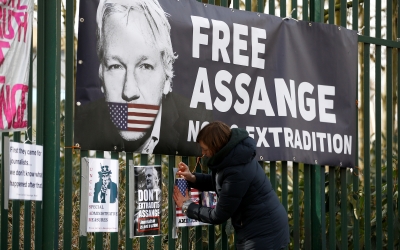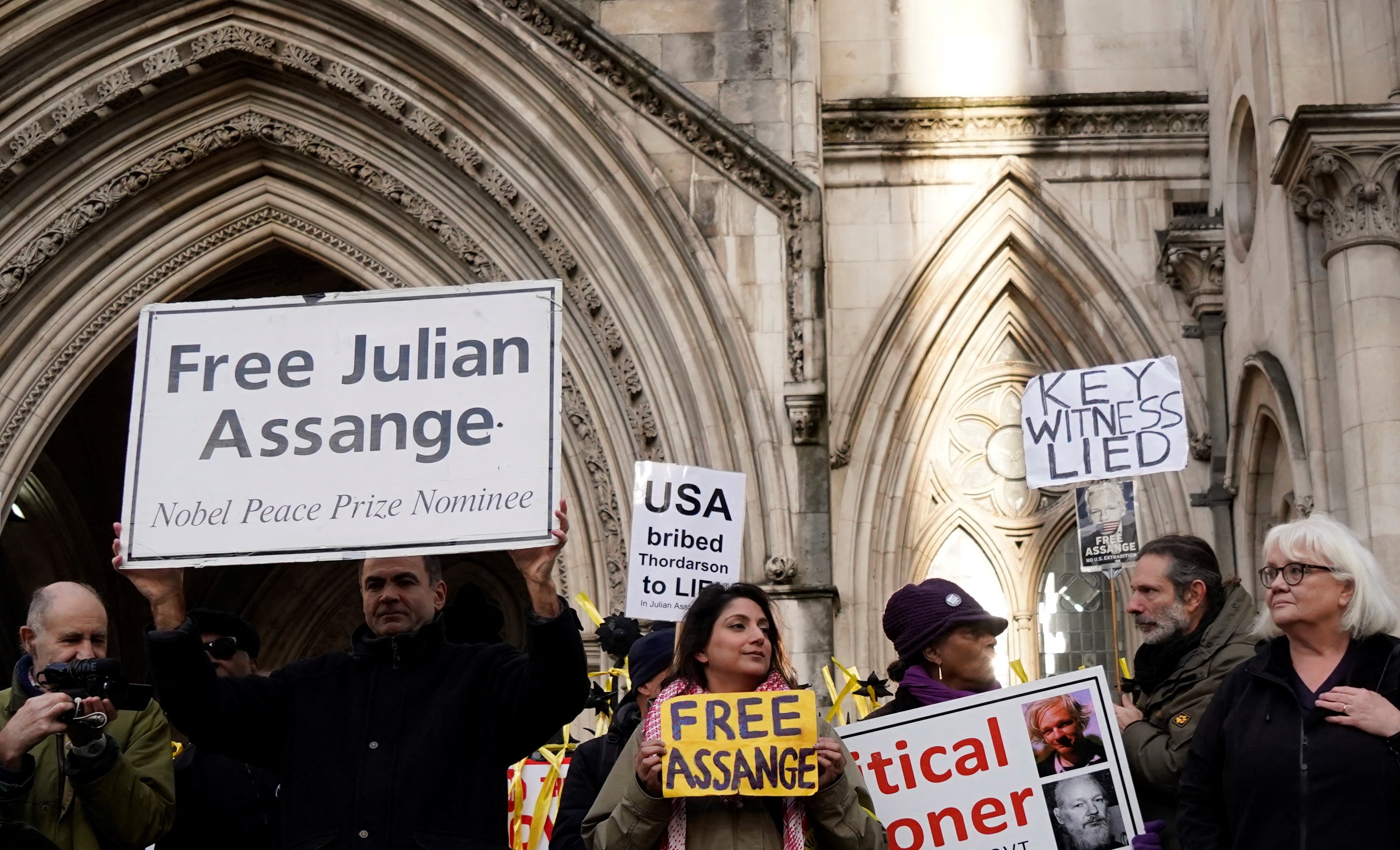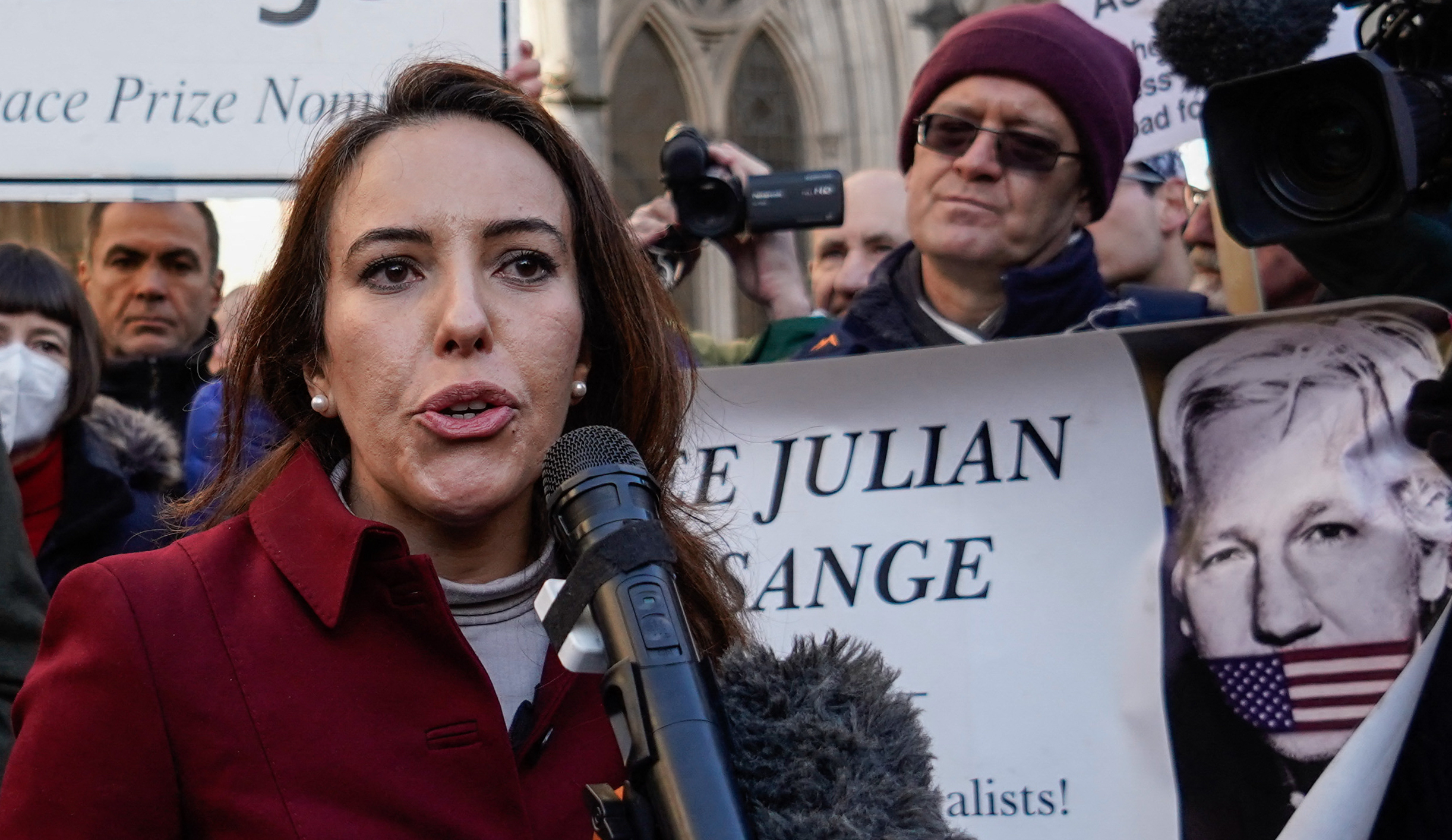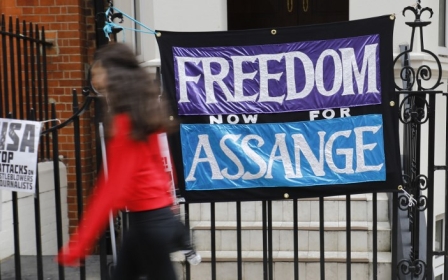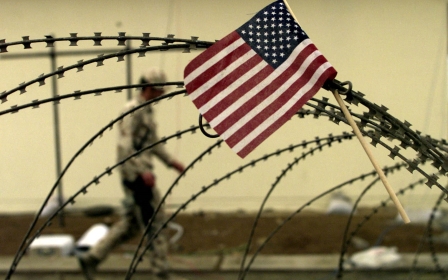The hounding of Julian Assange leaves honest journalism with no refuge
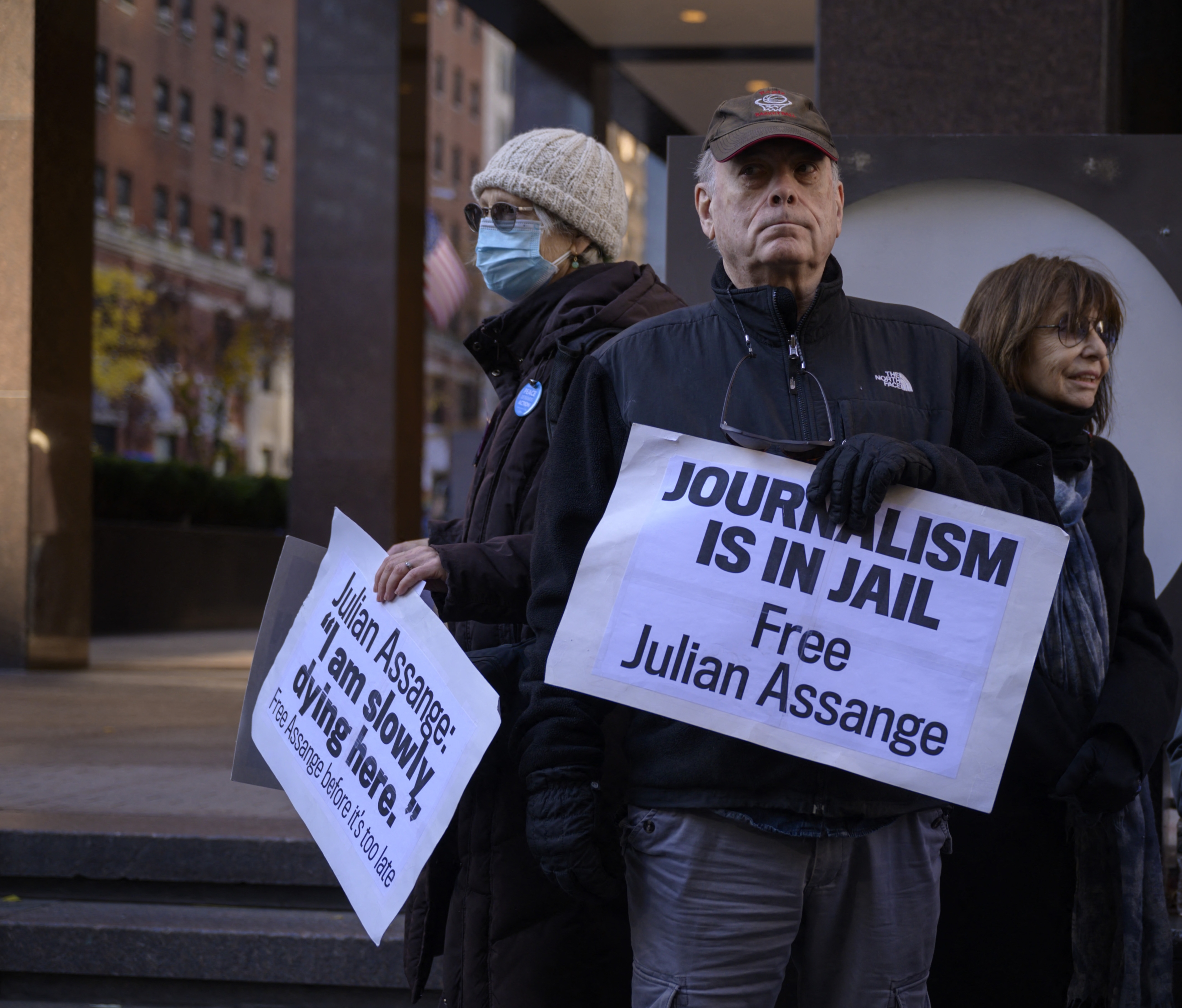
It is no accident that Julian Assange, the digital transparency activist and journalist who founded Wikileaks to help whistleblowers tell us what western governments are really up to in the shadows, has spent 10 years being progressively disappeared into those very same shadows.
It is the ultimate, ugly paradox that Assange’s legal and physical fate rests in the hands of two states that have the most to lose by allowing him to regain his freedom
His treatment is a crime similar to those Wikileaks exposed when it published just over a decade ago hundreds of thousands of leaked materials – documents we were never supposed to see – detailing war crimes committed by the United States and Britain in Iraq and Afghanistan.
These two western countries killed non-combatants and carried our torture not, as they claimed, in the pursuit of self-defence or in the promotion of democracy, but to impose control over a strategic, resource-rich region.
It is the ultimate, ugly paradox that Assange’s legal and physical fate rests in the hands of two states that have the most to lose by allowing him to regain his freedom and publish more of the truths they want to keep concealed. By redefining his journalism as "espionage"– the basis for the US extradition claim – they are determined to keep the genie stuffed in the bottle.
Eyes off the ball
New MEE newsletter: Jerusalem Dispatch
Sign up to get the latest insights and analysis on Israel-Palestine, alongside Turkey Unpacked and other MEE newsletters
Last week, in overturning a lower court decision that should have allowed Assange to walk free, the English High Court consented to effectively keep Assange locked up indefinitely. He is a remand prisoner – found guilty of no crime – and yet he will continue rotting in solitary confinement for the foreseeable future, barely seeing daylight or other human beings, in Belmarsh high-security prison alongside Britain’s most dangerous criminals.
The High Court decision forces our eyes off the ball once again. Assange and his supposed "crime" of seeking transparency and accountability has become the story rather than the crimes he exposed that were carried out by the US to lay waste to whole regions and devastate the lives of millions.
The goal is to stop the public conducting the debate Assange wanted to initiate through his journalism: about western state crimes. Instead the public is being deflected into a debate his persecutors want: whether Assange can ever safely be allowed out of his cell.
Assange’s lawyers are being diverted from the real issues too. They will now be tied up for years fighting endless rearguard actions, caught up in the search for legal technicalities, battling to win a hearing in any court they can, to prevent his extradition to the United States to stand trial.
The process itself has taken over. And while the legal minutiae are endlessly raked over, the substance of the case – that it is US and British officials who ought to be held responsible for committing war crimes – will be glossed over.
Permanently silenced
But it is worse than the legal injustice of Assange’s case. There may be no hack-saws needed this time, but this is as visceral a crime against journalism as the dismemberment of the Washington Post columnist Jamal Khashoggi by Saudi officials back in 2018.
And the outcome for Assange is only slightly less preordained than it was for Khashoggi when he entered the Saudi embassy in Istanbul. The goal for US officials has always been about permanently disappearing Assange. They are indifferent about how that is achieved.
The goal for US officials has always been about permanently disappearing Assange. They are indifferent about how that is achieved
If the legal avenue is a success, he will eventually head to the US where he can be locked away for up to 175 years in severe solitary confinement in a super-max jail – that is, till long past his death from natural causes. But there is every chance he will not survive that long. Last January, a British judge rejected extraditing Julian Assange to the US over his "suicide risk", and medical experts have warned that it will be only a matter of time before he succeeds.
That was why the district court blocked extradition – on humanitarian grounds. Those grounds were overturned by the High Court last week only because the US offered “assurances” that measures would be in place to ensure Assange did not commit suicide. But Assange's lawyers pointed out: those assurances "were not enough to address concerns about his fragile mental health and high risk of suicide". These concerns should have been apparent to the High Court justices.
There is no need to speculate about the Americans’ bad faith. It is only too apparent in the myriad get-out clauses in the "assurances" they provided. Those assurances can be dropped, for example, if US officials decide Assange is not being cooperative. The promises can and will be disregarded the moment they become an encumbrance on Washington’s ability to keep Assange permanently silenced.
'Trapped in a cage'
But if losing the extradition battle is high stakes, so is the legal process itself. That could finish Assange off long before a decision is reached, as his fiancee Stella Moris indicated at the weekend. She confirmed that Assange suffered a small stroke during a hearing in October in the endless extradition proceedings. There are indications he suffered neurological damage, and is now on anti-stroke medication to try to stop a recurrence.
Assange and his friends believe the stroke was brought on by the constant double strain of his solitary confinement in Belmarsh and a legal process being conducted over his head, in which he is barely allowed to participate.
Nils Melzer, the United Nations expert on torture, has repeatedly warned that Assange has been subjected to prolonged psychological torture in the nine years since he fled into Ecuador’s embassy in London seeking asylum from US efforts to persecute him.
That form of torture, Melzer has pointed out, was refined by the Nazis because it was found to be far more effective at breaking people than physical torture. Moris told the Daily Mail: “[The stroke] compounds our fears about [Assange’s] ability to survive the longer this long legal battle goes on. … Look at animals trapped in cages in a zoo. It cuts their life short. That's what's happening to Julian.”
And that indeed looks to be the prize for US officials that wanted him assassinated anyway. Whatever happens to Assange, the lawless US security state wins: it either gets him behind bars forever, or it kills him quietly and quite lawfully, while everyone is distracted, arguing about who Assange is rather what he exposed.
Political prisoner
In fact, with each twist and turn of the proceedings against Assange we move further from the realities at the heart of the case towards narrative distractions.
No journalist will dare to repeat what Assange did – not unless they are ready to spend the rest of their days behind bars
Who remembers now the first extradition hearings, nearly two years ago, at which the court was reminded that the very treaty signed by Britain and the US that is the basis for Assange’s extradition explicitly excludes political cases of the kind being pursued by the US against Assange?
It is a victory for state criminality that the discussion has devolved to Assange’s mental health rather than a substantive discussion of the treaty’s misapplication to serve political ends.
And similarly the focus on US assurances regarding Assange’s wellbeing is intended to obscure the fact that a journalist’s work is being criminalised as "espionage" for the first time under a hurriedly drafted, draconian and discredited piece of First World War legislation, the 1917 Espionage Act. Because Assange is a political prisoner suffering political persecution, legal arguments are apparently powerless to save him. It is only a political campaign that can keep underscoring the sham nature of the charges he faces.
The lies of power
What Assange bequeathed us through Wikileaks was a harsh light capable of cutting through the lies of power and power of lies. He showed that western governments claiming the moral high ground were actually committing crimes in our name out of sight in far-off lands. He tore the mask off their hypocrisy.
He showed that the many millions who took to the streets in cities around the world in 2003 because they knew the US and UK would commit war crimes in Iraq were right to march. But he also confirmed something worse: that their opposition to the war was treated with utter contempt.
The US and UK did not operate more carefully, they were not more respectful of human rights, they did not tread more lightly in Iraq because of those marches, because of the criticism beforehand. The western war machine carried on regardless, crushing the lives of anyone who got caught up in its maw.
Now with Assange locked up and silenced, western foreign policy can return comfortably to the era of zero accountability that existed before Assange shook up the whole system with his revelations. No journalist will dare to repeat what Assange did - not unless they are ready to spend the rest of their days behind bars.
The message his abuse sends to others could not be clearer or more chilling: what happened to Assange could happen to you too.
The truth is journalism is already reeling from the combined assaults against Khashoggi and Assange. But the hounding of Assange strikes the bigger blow. It leaves honest journalism with no refuge, no sanctuary anywhere in the world.
The views expressed in this article belong to the author and do not necessarily reflect the editorial policy of Middle East Eye.
Middle East Eye delivers independent and unrivalled coverage and analysis of the Middle East, North Africa and beyond. To learn more about republishing this content and the associated fees, please fill out this form. More about MEE can be found here.



